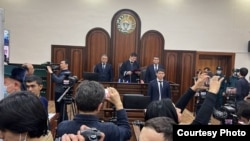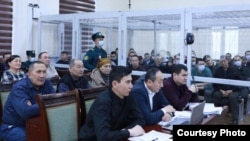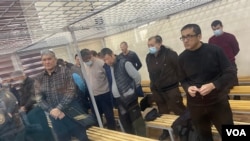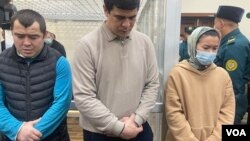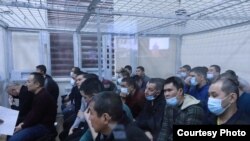On January 31, when Uzbekistan found 22 Karakalpaks guilty of crimes against the state, VOA spoke with seven of them, including a prisoner who died four days later. Their stories reveal the complexities and contradictions prevailing in this part of Central Asia.
In Bukhara, the trial of 39 more Karakalpaks is underway with no reporters or outside observers present. “The doors are wide open,” said Aziz Abidov, the court’s spokesperson.
The defendants in both trials, almost all men, were charged in connection with unrest on July 1- 2, 2022, that ended in the deaths of at least 21 people in the Republic of Karakalpakstan, an autonomous western territory of Uzbekistan.
Authorities cited security concerns as justification for holding the trials in Bukhara, rather than Karakalpakstan, where large crowds gathered during hearings held after the arrests of 516 people suspected of involvement in the violence.
As the trial of the first 22 began in November, the Interior Ministry confirmed it had 59 people in custody, including those in the first batch prosecuted, and that two had been conditionally released.
The proceedings have attracted little attention or media coverage in the capital, Tashkent, where many people have simply assumed that the system would find all the accused guilty.
Several media outlets, including those in Karakalpakstan, said they lacked resources to cover the trials, and in any case preferred to avoid “headaches with authorities.” But the website Gazeta.uz had its cameras in the courtroom for a few days.
VOA observed the last part of the first trial and on January 31 carried the verdict live: six defendants were released with suspended sentences, and the others received prison terms. Dauletmurat Tajimuratov, 44, described as “the mastermind of the attempt to overthrow the Karakalpak government,” was sentenced to 16 years.
Denouncing the verdict, his brother Renat Tajimuratov told VOA that the family had no complaints about the process or the judge.
“We will definitely appeal the sentence,” Tajimuratov said. “We proved that my brother did not commit any crimes against the state, did not engage in separatism nor urge people to commit violence. … This trial exposed the accusations were baseless. All should have walked free today.”
He argued that the unrest was instigated by politicians in Tashkent and the regional capital, Nukus, who pushed for constitutional changes that would have deprived Karakalpakstan of its autonomous status. “How come none of these folks are being held accountable? Why aren’t they on trial?” Tajimuratov asked.
VOA heard similar grievances from every Karakalpak in Bukhara, including the defendants and their relatives. Almagul Seytimbetova appealed to the president to pardon her son Nurlan Sultamuratov, 24, who received a three-year prison sentence “for threatening public safety.”
Following the violence, President Shavkat Mirziyoyev quickly rescinded the proposed amendments to the constitution, which currently describes Karakalpakstan as a sovereign republic with the right to secede through a referendum, a special status thousands of citizens came out defending. On February 8, the Uzbek general prosecutor’s office announced that three law enforcement officers were under arrest for their role in the July unrest.
At trial, the defendants, including the only female, Lolagul Kallykhanova, 34, said the protest was prompted by concern that Karakalpakstan would lose its special status as a republic within Uzbekistan.
Kallykhanova, a journalist-blogger, and other co-defendants in the courtroom were tearful. Publicly expressing contrition, they stressed that they had been merely exercising their constitutional right to free expression.
None of those VOA spoke with complained about detention conditions or claimed to have been tortured. But during the trial, Tajimuratov described having suffered physical abuse at the time of his arrest.
When VOA asked Ahmet Smetullayev, 30, about his worst moment in jail, he said, “I don’t wish anyone to ever end up there.”
Polat Shamshetov, 45, former internal affairs officer and son of a former Karakalpak leader, expressed relief that he had “only received six years” for what he described as being “in the wrong place at the wrong time.”
Shamshetov said the detainees were treated better now than in the past. “Having been part of the system, I surely notice the difference.”
But he died February 4 from a reported "thromboembolism of the pulmonary artery and acute heart failure." A parliamentary commission investigation confirmed that conclusion, but many Karakalpak activists remain unconvinced.
Bakhtiyar Kadirbergenov, 37, said he came back from Russia to help Karakalpakstan develop. As an engineer, he had opportunities abroad, but aspired to launch a social enterprise at home, “plans destroyed by last year's events.” He was sentenced to seven years in prison.
Baffled
Seyipnazar Kalimov, 43, who got a six-year sentence, insisted his participation in the protest was minimal. Calling himself "uneducated, lost in the crowd,” he claimed he didn't hurt anyone and saw himself as victim of some conspiracy that "I don't understand.”
“I’m not against anyone or any government,” said Azamat Turdanov, 38, another of those who were released.
Like other defendants, Turdanov maintained that no foreign element supported the protesters, refuting a theory put forward by officials, including some of those in Karakalpakstan’s leadership.
“We are not traitors,” exclaimed Azamat Nuratdinov, 34, who wrote poems during his seven months of pre-trial detention. Reciting lines on Uzbek-Karakalpak unity, he urged people to stay calm, adding: “Don't believe in everything you see online.”
Domestic and foreign critics have cited the trial as evidence that the Uzbek court system still lacks an independent judiciary.
But Kallykhanova said she did not worry about such assessments. “I’ve never been afraid of telling the truth. I spent seven months behind bars and would not hide it if abused in any way. We’ve had enough time and the opportunity to speak up,” she said, rejecting suspicions that defendants were prepped for trial.
Prosecutors had asked for 11 years in prison; she got three years of probation. Kallykhanova said she had been bracing for the worst, speculating that the judge must have shown mercy to a “woman of childbearing years.”
Almost all the defendants, previous and current, have expressed remorse. They include journalists, entrepreneurs and other specialists. Karakalpak activists, including in Europe and neighboring countries, say fear drives these courtroom confessions.
Persecution
Watching from Kazakhstan, Aqylbek Muratbai sees only the persecution of Karakalpaks.
“I'm convinced that arrests after [the] Karakalpakstan protests aren't carried out on principle. They arrested everyone who was somehow engaged in civic activity and is respected among Karakalpaks. There is a purposeful destruction of Karakalpak intelligentsia,” Muratbai wrote on Twitter.
"Every Uzbekistan citizen (including me) risks being persecuted for civic activism, arrested on false charges, unfair trial, torture and accidental death in prison,” he tweeted, adding “this leads to even more radicalization of supporters of Karakalpakstan separation.”
The parliamentary commission, tasked to report on the turmoil, includes rights defenders Azam Farmonov and Gulnoz Mamarasulova, representing local and foreign organizations.
Farmonov, a former political prisoner, told VOA, “This has probably been the most open and fair court proceeding ever in Uzbekistan.”
“Extensive work is required to achieve judicial independence, but this trial demonstrated that if steps are taken accordingly, we can ensure freedoms and the rule of law,” Farmonov said.
Mamarasulova admitted that Uzbekistan’s criminal justice system has long been corrupt: “As a result, there is multifold distrust and hate among our people towards the system.”
But in recent years, she has observed improvements: “Thousands of people have been exonerated of baseless charges in trials nationwide.”
She said Uzbekistan, including Karakalpakstan, will have to be resolute because an abysmal rights record still overshadows advancements.
Mamarasulova agrees with those demanding fairness and integrity: “The government must be accountable to its people. If they wanted to amend the constitution, they should have checked with the Karakalpak people first. That kind of engagement could have prevented this unrest.”
Editor’s Note: The 8th and 28th paragraph has been updated to clarify details and correct Kallykhanova's sentence.
